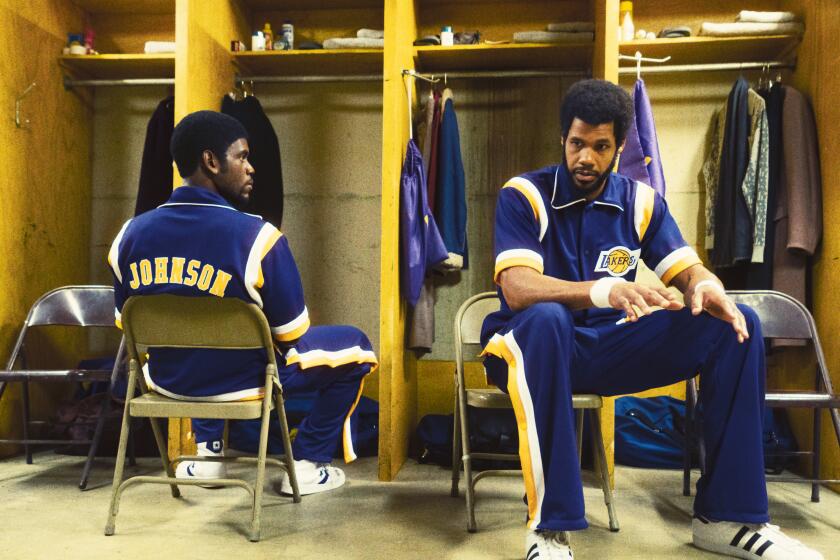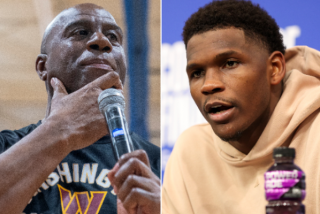- Share via
At a time when HIV was still seen as a death sentence, Magic Johnson shocked the world by announcing he was infected. But the bigger shock may have been what happened next.
In Episode 9 of “Binge Sesh,” hosts Matt Brennan and Kareem Maddox explore the defining moment that opens HBO’s “Winning Time”: Magic Johnson’s 1991 diagnosis with HIV. With help from experts and Johnson’s fans, we reflect on the announcement’s seismic impact and explore how it changed the face of the disease at the height of the AIDS crisis.
Listen now
Catch up on Episode 8: Inside the origins of the NBA’s own war on drugs
Robert Wade: The only time I’ve been as shocked was when I was sitting in the student union at UCLA and they announced over the intercom that JFK had been assassinated. Those are the two things that I, you know, the kind of thing where you remember exactly where you were when you heard about it.
Ron and Mary Weiss: I remember that horrible day. I was sick. The whole town was just — I remember. Seared into your memory.
Jim Hecht: It was a long time ago — it was 1991 — and I remember it like crystal clear.
Max Borenstien: I remember literally where I was.
Salli Richardson-Whitfield: I was in Jamaica at a golf tournament.
Syrus Yarbrough: I was playing my first year at Santa Monica College.
Jeff Pearlman: I was in college. I was at my student newspaper.
Borenstien: At my elementary school.
Jim Hecht: I was at, uh, Central Oklahoma University for a debate tournament. And we were in a meeting in one of the hotel rooms and our coach came in and said, “Magic Johnson just announced that he had HIV.”
Mary Weiss: He announced that November 7th. I just remember thinking, “It, it can’t be true.” It was awful. I felt like somebody died.
Richardson-Whitfield: Back then, you thought it was over, and it was confusing.
Borenstien: It seemed absolutely inevitable that that was a death sentence. HIV meant AIDS. AIDS meant death.
Yarbrough: It was a death sentence, everyone thought.
Hecht: We thought that we were going to watch Magic get very thin and pass away.
Pearlman: Nobody lives with this. This is a death sentence.
Wade: Well, yeah, it was a death sentence. And it was, for a lot of people, it was a death sentence for people who deserved to die.
Matt Brennan: That was Robert Wade, Rob and Mary Weiss, Jim Hecht, Max Borenstein, Salli Richardson-Whitfield, Syrus Yarbrough and Jeff Pearlman remembering the day Magic Johnson announced this diagnosis.
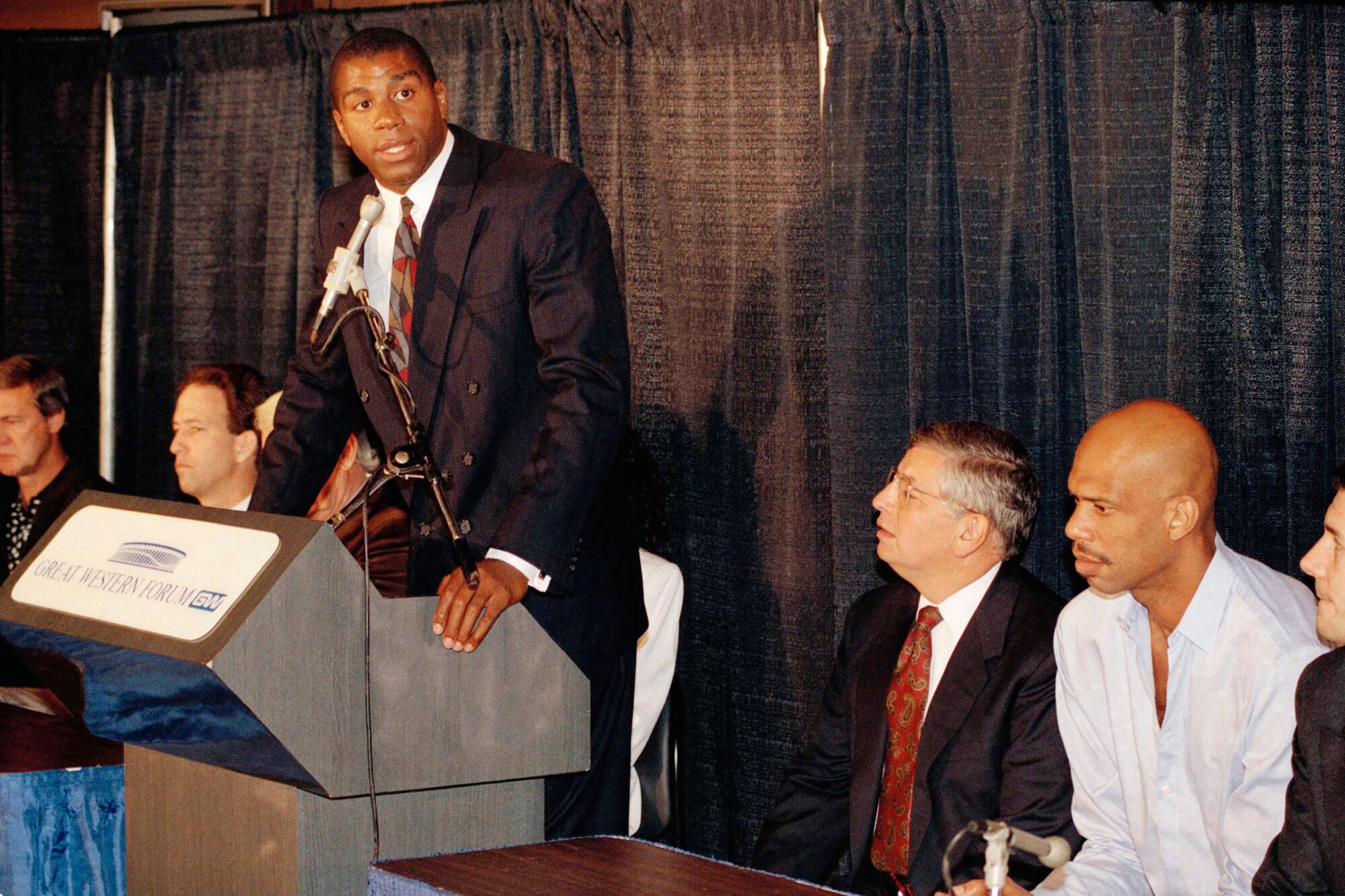
I think the thing that strikes me the most about hearing that montage is the phrase “death sentence” being repeated over and over. But in a 2011 interview with the L.A. Times’ Bill Plaschke, Magic Johnson himself says he never thought that.
Magic Johnson: I never thought I was going to die. I’m not that guy. I’m not that guy. I’ve been a competitor my whole life.
Brennan: What’s your reaction to the contrast between what everyone else expected to happen and what Magic expected to happen?
Kareem Maddox: My initial reaction is that Magic Johnson is an athlete, right? Like there’s something in athletics where you could never allow your mind to wander to the worst-case scenario, meaning you’re not allowed to consider losing. Something that we’ve been hearing about Magic throughout the season, which is that he’s one of the hardest workers in the NBA and as a basketball player.
And he decided to bring that approach to something that is really life or death. As we heard in that montage, people were devastated because they loved Magic Johnson. There were other people who reacted in completely different ways, right? People who said all kinds of things about him and the way he was living his life and whether or not he deserved to get HIV, which is obviously a terrible thing to say.
At the end of the day, all these years later, Magic Johnson has changed a lot of things. And a lot of things haven’t changed.
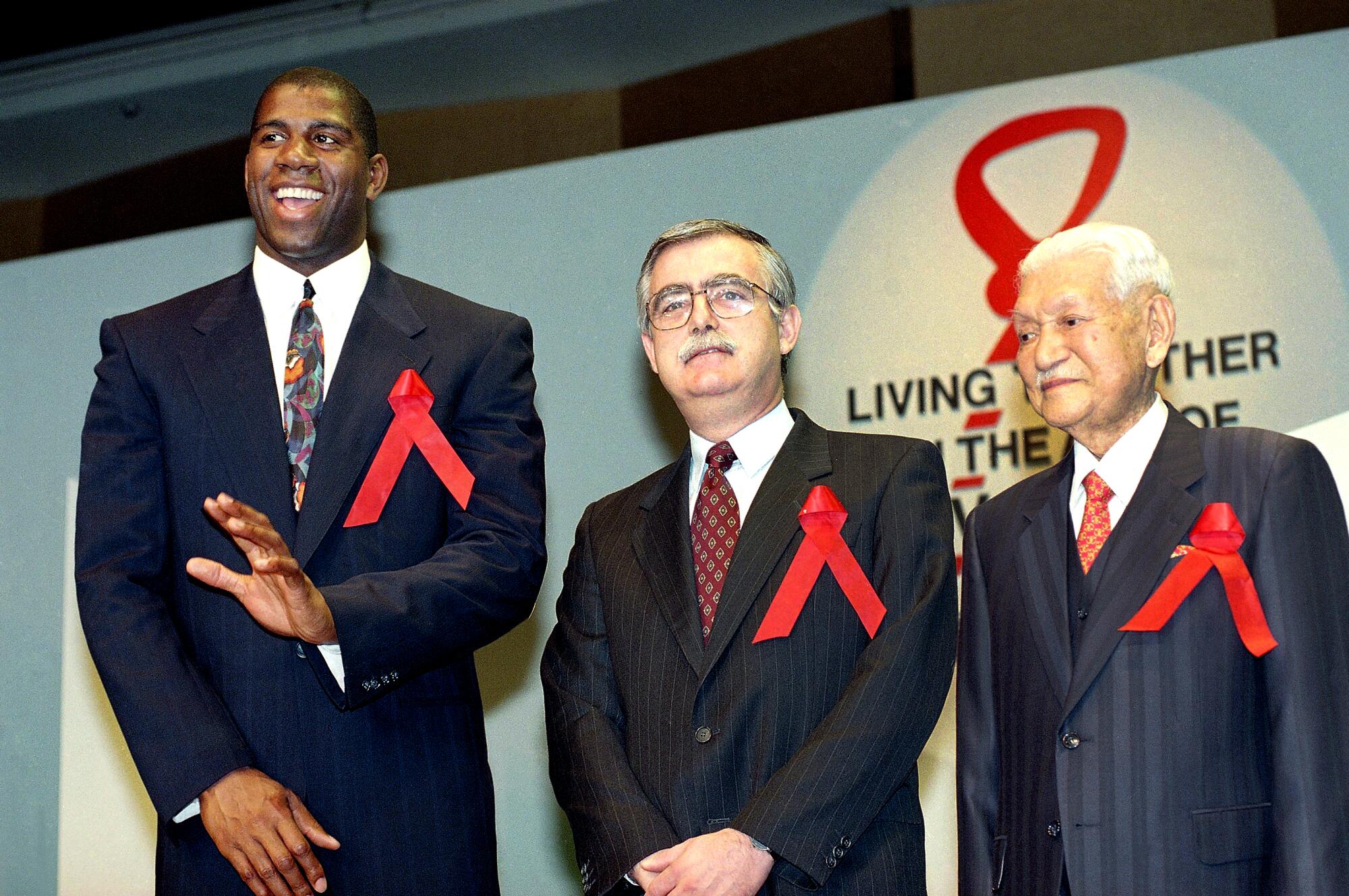
::
Brennan: Welcome to “Binge Sesh,” where this season we’re diving into the stories behind HBO’s “Winning Time,” the saga of the Showtime-era L.A. Lakers. I’m Matt Brennan, television editor of the Los Angeles Times.
Maddox: And I’m Kareem Maddox, professional basketball player and podcaster.
This week we’re tackling the moment that marked the end of Showtime: Magic Johnson’s 1991 announcement that he had HIV and was retiring from the NBA, effective immediately. And we’ll also talk about the years that followed — his successes off and back on the court, and what that meant for millions of people.
Brennan: We can’t ignore the fact that by coming out as HIV positive at a time before the development of effective treatments, when the disease was still seen as a death sentence that predominantly affected gay men, Magic Johnson changed the public face of HIV. And because he defied that quote unquote death sentence, he also provided a model for living with HIV for those who would be diagnosed in the years to come.
I just think we also need to acknowledge that because he was wealthy and because he was famous, he had some advantages in the fight against HIV that others did not. You can give Magic credit for bringing an entirely new kind of attention to the AIDS crisis without papering over the hard work of a generation of activists before him who had pushed for attention to HIV/AIDS.
Maddox: Absolutely.
Brennan: The vast majority of those who died from HIV in this period were men who had sex with men. I mean, you have to think that if, if there had been a disease that emerged in 1981 that started killing thousands of straight men a year, that the government would have moved faster to find an effective treatment for it. And instead, President Ronald Reagan didn’t even say the name of the illness until 1985, after it had already killed thousands of people.
Novelist and AIDS historian Sarah Schulman, who reported on the crisis from the start, described the consequences of this stigmatization of the disease.
Sarah Schulman: In the earliest years of the epidemic, only the gay press covered AIDS with any kind of complexity. The mainstream press had almost no coverage. And we were desperate to get them to cover it.
Unfortunately, once they started covering it, they distorted it. And so if you look at People magazine covers and talk shows and this sort of thing, you see that they divided people with aids into two categories: innocent victims and guilty victims. So a gay person or someone who was a drug user was a guilty victim, and they deserved no compassion and no support. An innocent victim would be, like, a white person who had a blood transfusion. And this was very, very, very detrimental.
Brennan: You go back and you read things from this era and you encounter a lot of nonsense about people being afraid to be in the same room with someone with HIV. Being afraid to kiss them. Being afraid to hug them.
Dr. Robert Fullilove, professor and associate dean at Columbia University’s Mailman School of Public Health, has been working on HIV/AIDS for more than three decades, and he says that even extended to medical workers.
Dr. Robert Fullilove: There were some hospitals where if it was found that you were HIV-infected, a substantial portion of the hospital staff — doctors and nurses — would avoid having anything to do with you. If you worked in HIV, people wondered whether or not just brushing up against you could produce an infection. So in addition to the scary elements of the illness and the horrific images that came out of it, the stigma and the fear that surrounded it just tripled the impact that it had on the general public. To do that work at that moment was about as difficult as anything you could do in medicine, I think, at that point in the 20th century.
Maddox: So with that context, Magic Johnson did something kind of revolutionary. He didn’t just announce that he had the virus — he made clear that he wanted his announcement to protect other people. Here he is in that 1991 press conference:
Johnson: I think sometimes we think, “Well, only gay people can get it.” And here I am saying that it can happen to anybody.
Brennan: Even if Magic had just focused on himself, it still would have been unusual that he made an announcement at all. Sam Graham-Felsen, the “Fiasco” podcast producer who appeared earlier this season to talk about the Lakers-Celtics rivalry, also produced a season about the AIDS crisis — and he cited Hollywood actor Rock Hudson, who died in 1985, as an example of someone who stigma forced to keep the illness a secret.
Sam Graham-Felsen: Rock Hudson, the great Hollywood actor, who was the first mega celebrity to publicly come out as having AIDS — he sort of acknowledged it publicly just days before died.
Brennan: Contrast that with Magic Johnson six years later. His announcement came almost immediately upon his diagnosis. But as he explained in 2011, he saw this issue as being bigger than himself.
Johnson: It was a difficult decision just to go public because [my wife] Cookie and I had to decide, you know, and so finally we said, “You know what, it’s the right thing to do.” And then it wasn’t difficult. It was the right thing to do.
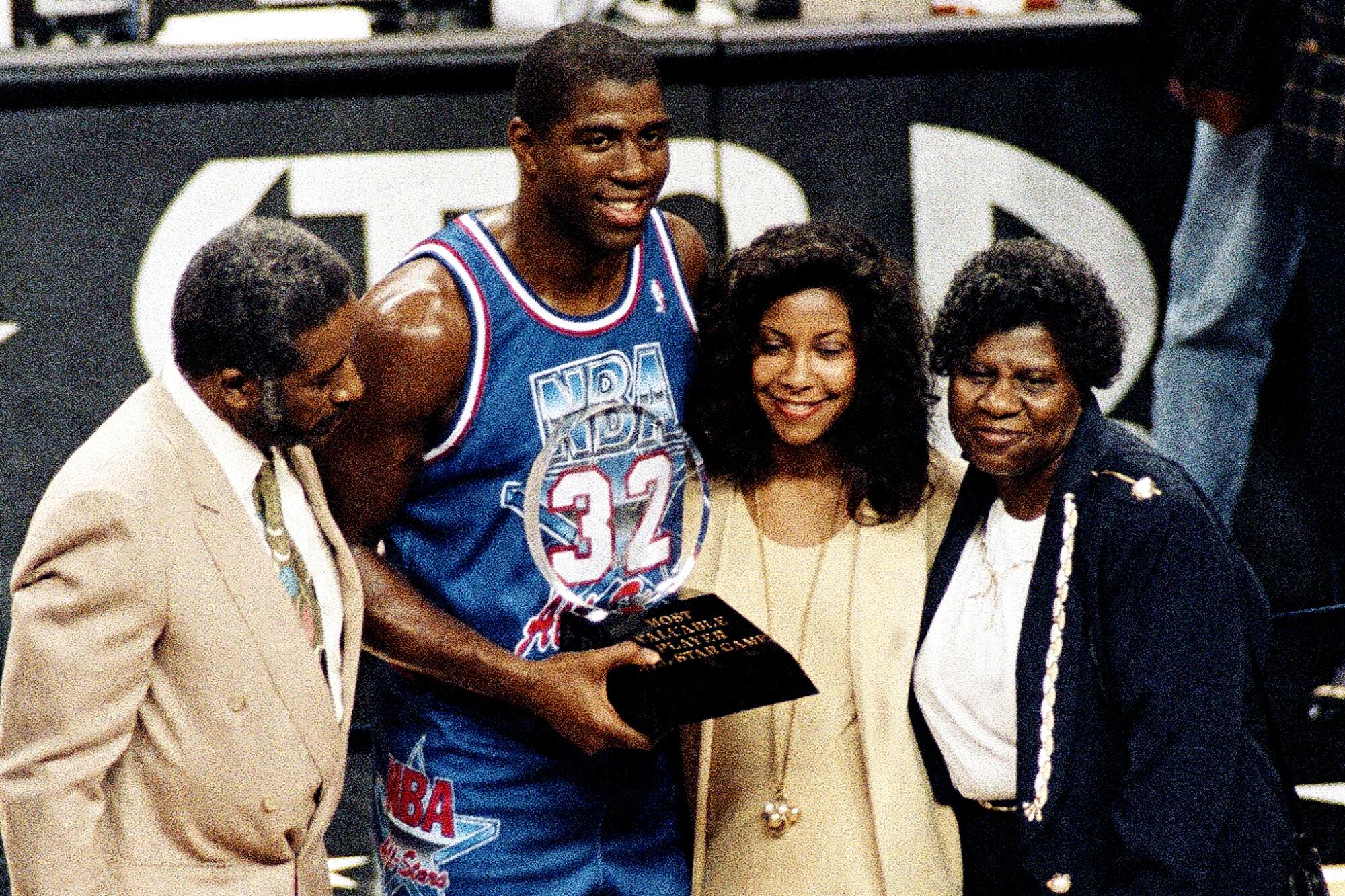
Maddox: Magic is like the only person who probably could have the confidence to publicly announce that he has something that everyone considers a death sentence in 1991 and still feel like, all right, there will still be a percentage of people that will support me.
Brennan: And he was right. L.A. Times sports columnist Bill Plaschke summed it up pretty nicely.
Bill Plaschke: I will forever, forever love Magic Johnson for what he did. He didn’t have to announce that he was HIV positive. He could have said, “I’m retiring because of concussion syndrome,” or, “I’m retiring because of a chronically bad back.”
Maddox: Magic choosing to reveal his diagnosis didn’t just shake the culture, though. It also had a demonstrable effect on the conversation around the management of HIV. And we’ll talk about that right after the break.
::
Brennan: Were you aware of Magic Johnson as someone who was living with HIV when you were growing up in the ’90s?
Maddox: Yeah, I mean, I was 2 years old when he did his press conference and when he was diagnosed, so I couldn’t tell you when those words actually made sense to me. And I think it was something that I was aware of, even if I was too young to know what that meant.
Brennan: What struck me about Magic was that he was, like, the one person where it didn’t seem — I don’t want to say that it didn’t seem like a big deal because I don’t want to diminish what he went through, but he made it seem manageable in a way that I think contrasted very sharply with the other messages that we were getting about HIV and AIDS in the 1990s.
Most people heard an HIV diagnosis as a quote unquote death sentence. And now the preferred terminology for someone who’s HIV positive is “someone living with HIV.” I think Magic, as you point out, becomes kind of an emblem of — he’s someone who didn’t just survive getting HIV, but has thrived in the time since. And I think in that, he’s a very important symbol of how the narrative around HIV/AIDS has changed since 1991.
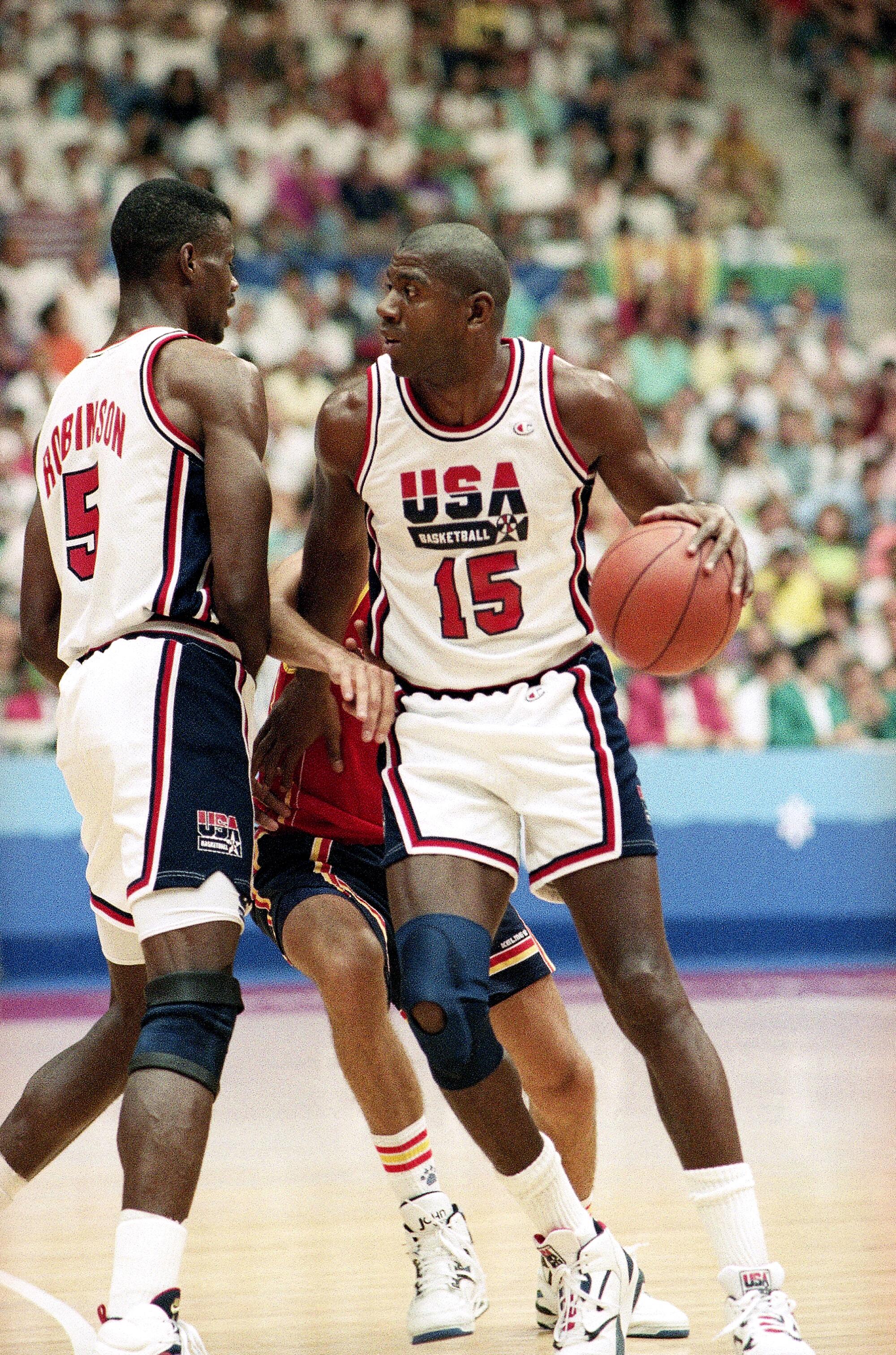
Maddox: How so?
Brennan: For one thing, there’s something actually called the Magic Johnson effect. I’ll let Dr. Fullilove explain.
Fullilove: There are papers that have been written about the Magic Johnson effect. A whole bunch of heterosexual men, Black and white, suddenly go, “Damn. If it can happen to Magic, it might be happening to me.”
So we have a peak of testing where all of a sudden, groups that had not basically followed our advice about checking your status were doing so in droves. It did not last, but it does describe the shock of the announcement and the awareness that people had that maybe the stigma, maybe the stereotypes of who gets infected with HIV, are a wee bit too simplistic.
Maddox: I imagine that the speed of development after ’91, in terms of the research on HIV and AIDS, advanced more quickly than it had before.
Brennan: Right. And on multiple levels. Sam Graham-Felsen pointed to a direct connection between Magic’s personal care team and the emergence of a key treatment that made living with HIV possible.
Graham-Felsen: There were treatments that were working now, and he was one of the earliest people on these treatments. His personal doctor is this guy, David Ho, who was one of the crucial scientists who helped make the discovery of the triple cocktail. So Magic was one of the first people to demonstrably get better taking these drugs and show the world that you could survive a positive diagnosis.
Brennan: Dr. Fullilove described Magic’s impact in the broad strokes, too.
Fullilove: HIV/AIDS was, until the arrival of effective medications, a routinely fatal condition. If you were doing HIV work in 1990, you were basically engaged in prevention. That was the only response we had. I’d like to suggest that everything we’ve done since 1990 has really been at least in part, in public health, based on what we learned by watching what happened with Magic Johnson. So the Congress finds the means over a period of a couple of years to start putting more and more money, investing more and more, in HIV treatments and HIV prevention and in a variety of activities that I believe led to the discovery of the antiretrovirals that we now have in place.
Magic demonstrated that this was something that was not isolated, and the Congress, which had often been lax to do very much because it didn’t believe that it affected the populations that had voted them in office, suddenly had to wonder whether or not they were doing something that would ultimately be a topic of condemnation. I think it’s fair to say that the awareness that came about as a result, that Magic Johnson’s infection had a great deal to do with that.
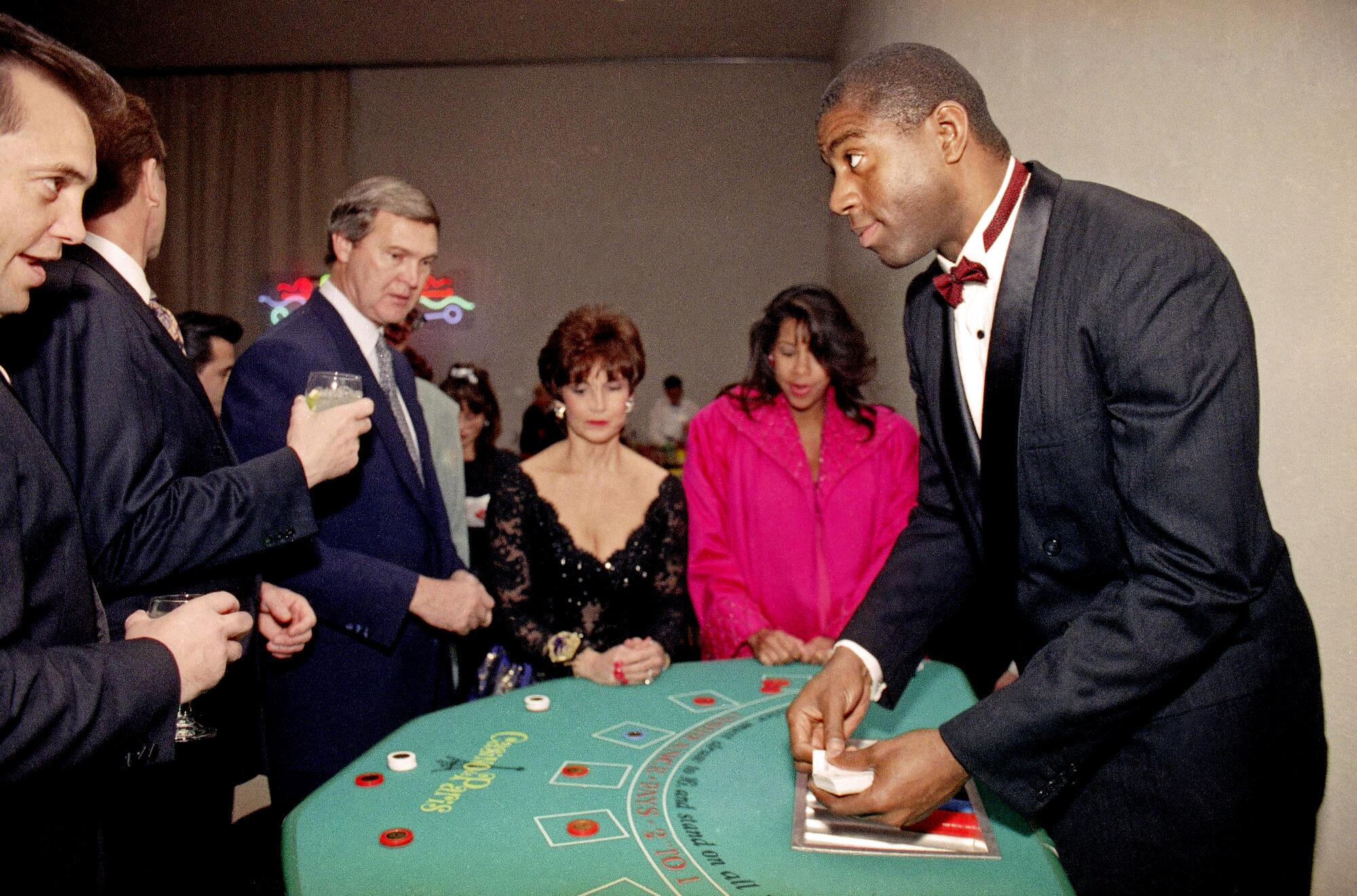
Maddox: It makes sense then that at the time, there were rumors at the time about what kind of treatment Magic was receiving. Syrus Yarbrough, who was in our montage at the top of the episode, remembers some of them:
Yarbrough: There was all these rumors that flow around, “Oh, he’s got a lot of money, so he flies over to Europe and they suck all the blood out of his body. And then they put in new blood, and there’s no traces of it. ’Cause it’s new blood. He’s good.” Supposedly he was doing this every few months.
Brennan: I think those rumors are a product of just how unbelievable it seemed that he would be able to survive. Like you had to come up with a kind of science-fiction narrative in order to make sense of him living for years after the diagnosis, because that was how unbelievable that notion sounded in 1991.
Maddox: Bill Plaschke captured that in his description of post-diagnosis Magic — who played on the Olympics Dream Team in 1992 and later returned to the Lakers for stints as a coach, player and general manager. Magic launched a business empire. He even just made his own Lakers series. The way Plaschke described him, he became someone with basically nothing to lose.
Plaschke: I think he thought he was going to be dead. And I think that’s what led to so many things he’s done. He came back. He tried to play again. He quit again. He tried to coach again; he quit. Jeannie [Buss] made him run the Lakers; he quit that. He goes from business to business, speech to speech. He grabs every bit of life. Because I think he really realized in that moment, back in ’91, how finite it all is.
Brennan: So Magic changed the face of the AIDS crisis. And he provided a template for living with HIV. But we still don’t have a cure — for the disease, or for the social ills that fuel it. And we’re going to talk about that after this break.
::
Brennan: Here’s a fact I came across while researching this episode: At the time of Magic’s diagnosis, AIDS had already killed more than 126,000 Americans.
Maddox: And 126,000 were over how many years, roughly?
Brennan: Well, it would have been about 10 years at that point because HIV was first identified in 1981.
Maddox: For those 126,000 people, was it just as though they died and everyone was like, “Well, we have a name for it and we know what it does, but we, you know, there’s no answer”? Is that just where they were at?
Brennan: I mean, the conversation around HIV/AIDS in the gay community is very different from the way that it’s treated even to this day in the broader culture. We’re talking about essentially a lost generation of gay men. That is how many people that it killed. And it leaves this big sort of gaping hole in American gay culture. And I think the feeling — and this is, I think, an accurate assessment — was that more or less the government had decided that it was acceptable for all of those people to die because they were gay.
Maddox: Yeah. I mean, it’s — as a straight man, I had never thought about that. That is a big chunk of that demographic in that time period, you know, thinking about it as a lost generation.
Brennan: What hasn’t changed about HIV since Magic’s diagnosis — I mean, again, we don’t want to undersell how important it was that he came out, that he became an advocate for more resources and attention. But that doesn’t mean that there is no more stigma. I think that stigma still prevents a lot of people from seeking regular testing and treatment.
Maddox: I think people are still just afraid.
Brennan: Right. And we live in a culture that I think, even though it’s very different from the one that existed in 1981 or 1991, we still sort of cling to a pretty prudish approach to sexual health, where so much of the messaging is more around shaming or punishing people for their sexual choices rather than giving them the tools and information and resources to, for example, get tested regularly so that you know if you contract an STI and can notify your partners.
Maddox: Yeah. I wonder if there’s other countries that do.
Brennan: I mean, a lot of other countries, like just in general, the government provides healthcare.
Maddox: Good point. Also, some of those countries are a little bit less prudish, as you put it, about the way they talk about sexual health and therefore it fitting into the rest of their nationalized healthcare.
Brennan: In the United States, we are taught to keep the fact that we are sexual beings to ourselves and to feel ashamed about sex and contracting an STI, which can happen to anyone, like, it’s not anything to be ashamed of. I don’t think that’s really changed.
There’s certainly been improvements in the speed and accuracy of the testing, and hugely important has been the improvements in the actual treatments for HIV and the prevention thereof. But in terms of the culture around it, I don’t know.
Maddox: There’s micro-communities, I would say, that have started to address this issue that you’re talking about, but the way we talk about stuff in the States with regards to sexual health, especially — yeah, no, I wouldn’t imagine that it has changed that much. It’s a tension you always feel. So there’s some voices that are just kind of outsized in the States, and a lot of that stems from politics, for sure. And some of those with outsized voices are also the ones who don’t speak openly about things like sexual health.
Brennan: Yeah. And I think it, I mean, it goes back to issues of power. When we’re talking about what has and has not changed about HIV specifically, we’re talking about disparities of sexual orientation. We’re talking about racial disparities.
Fullilove: HIV has been and continues to be identified as a health disparity, meaning that the proportion of folks even in 1986 who were living with AIDS was substantially higher than their proportion of the populations for Blacks and/or Latinx populations. Does it persist to this day? Yes.
Brennan: We’re talking about economic disparities.
Schulman: If you were infected with HIV today, there are medications that you can take that can give you a normal lifespan, but there are people all over the world who can’t access those medications. Even in New York City, there’s a small number of people every year who die of AIDS because they’re diagnosed in the emergency room because usually they’re homeless or they’re completely outside of the healthcare system.
Brennan: We’re talking about gender disparities.
Schulman: There was mythology that female sex workers, which could potentially transmit HIV to their male customers and thereby threatened the entire family and all of this kind of thing, which justified police harassment of female sex workers. Actually, it was the other way around. They were the endangered parties who were being infected by men. Women have historically been seen as vectors of infection instead of as people with AIDS deserving of treatment.
Brennan: What we’re talking about when we’re talking about those disparities is who has power and who doesn’t. And fundamentally the fact that white, straight cisgender men have power in our society hasn’t changed.
::
Brennan: I didn’t realize that Anthony Fauci, Dr. Fauci —
Maddox: The Dr. Fauci?
Brennan: Our Dr. Fauci.
Maddox: Point guard?
Brennan: The Dr. Fauci helped treat Magic. I still don’t get what you meant when you said “point guard.” Like what is the point guard joke?
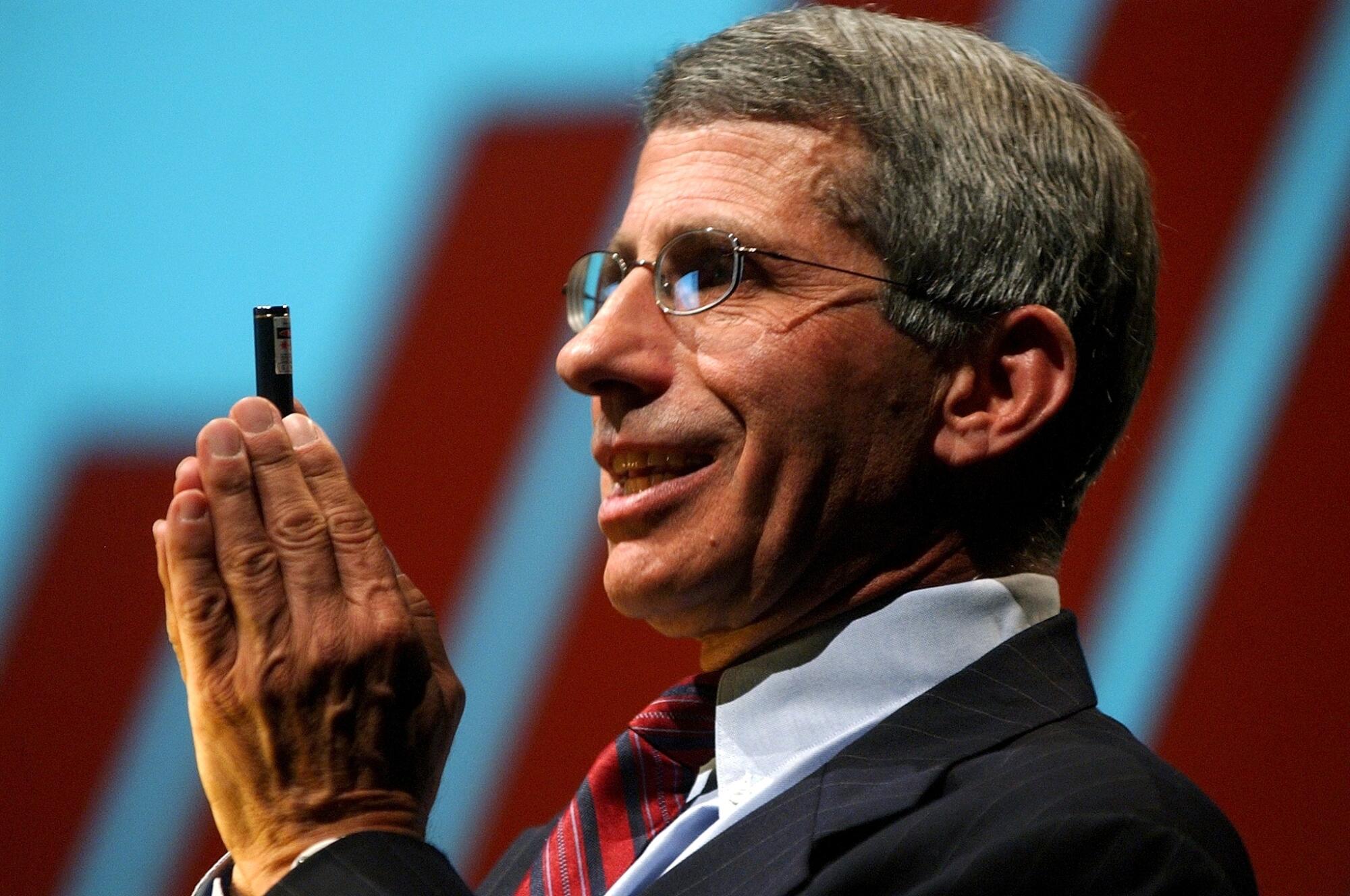
Maddox: Oh, wait, do you not remember the, uh — so remember at the beginning of the pandemic? Anthony Fauci played point guard in high school and he’s like, um, what did he call it?
Brennan: So he’s like an old-school point guard: short and fast.
Maddox: Yeah, yeah. He’s — New York City. Um, and he, there was a whole article. I forget, it was like in the Athletic or the Ringer or something about Fauci being a point guard at the beginning of the pandemic. Super funny.
Brennan: Oh, I totally missed that. Are you proud that I actually remembered what a point guard is?
Maddox: Yeah.
Brennan: And the various styles of point guard over the generations?
Maddox: You’re easily an intermediate basketball mind by this point in the season. At the very least.
Brennan: I actually feel like I need to — like next season, do you have like a fantasy league?
Everything you need to know about the true story of the Showtime Lakers, all in one place.
Additional resources
Earvin “Magic” Johnson with William Novak, “My Life” (1992)
Leon Neyfakh et al., “Fiasco: The AIDS Crisis” (2022)
Jeff Pearlman, “Showtime: Magic, Kareem, Riley, and the Los Angeles Lakers Dynasty of the 1980s” (2013)
Sarah Schulman, “Let the Record Show: A Political History of ACT UP New York, 1987-1993” (2021)
More to Read
The complete guide to home viewing
Get Screen Gab for everything about the TV shows and streaming movies everyone’s talking about.
You may occasionally receive promotional content from the Los Angeles Times.

